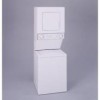GE WSM2480DWW Use and Care Manual - Page 8
How To Load Your Washer, Suggested Fabric And Cycle Settings, For Your Washer
 |
UPC - 084691096344
View all GE WSM2480DWW manuals
Add to My Manuals
Save this manual to your list of manuals |
Page 8 highlights
SUGGESTED FABRIC AND CYCLE SETTINGS FOR YOUR WASHER Cycle Suggested For Clothes Load/Fabrics such as: Permanent Press and Knits • Synthetics • Permanent press, treated cottons, blends with cottons • Down-filled garments, if machine washing is recommended* Delicates • Baby clothes (delicate) • Lingerie Regular • Cottons and linens • Denims • Baby clothes (sturdy) Special Instructions *Down-Filled Garments Wash frequently to fluff up the down and retain the garment's warmth. WASH SEPARATELY. Wet down gives off an odor which may be absorbed by other garments. Odor disappears when garment is dry. Treat heavily soiled areas with liquid detergent or a paste made of water and powdered detergent. Close zippers. Wash 2 or 3 garments at a time or add towels to balance. GARMENT MUST BE TUMBLE-DRIED. HOW TO LOAD YOUR WASHER This illustration, with clothes just reaching the Clothes Retaining Ring, shows a proper load. Clothes have ample room to move because they are not packed down, nor 3 wrapped around the agitator. Clothes are loaded dry since wet items are likely to pack down 2 which encourages overloading. This size load requires a full 1 water fill. What is the best size load of clothes-large, medium or small? Save time, energy and detergent by avoiding extra use of the washer. Try to wash a full load of clothes. If you can, it is better to save clothes until you have a full load. If you must wash smaller loads, save water, energy and detergent by adjusting the water level for the size of the load. See Operating the Washer. • Load clothes dry. • Take a properly sorted group of clothes and drop them loosely in the wash basket in this order: Large items-like sheets. Do not wrap around the agitator. Small items-like washcloths. Medium size items-like towels. DO NOT OVERLOAD YOUR WASHER. • Try to mix large and small items in each machine load for better washing action. • Wash large items (blankets, bed spreads, mattress pads, etc.) separately. • If machine is overloaded, you may experience oversudsing or out-of-balance conditions. 8















